The forex market is one of the most exciting and accessible financial markets in the world, but it comes with risks, especially when choosing a reliable broker. To help you trade with confidence and safety, we’ve identified five of the most regulated forex brokers worldwide. This comparison will highlight why regulation is necessary and what benefits you can expect from each of these top brokers.
These are our Top 5 Regulated Forex Brokers:
Broker:
Regulation:
Advantages:
Account:
ASIC, FSCA, FSA, FSC, CySEC
- Spreads from 0.0 Pips
- More than 10,000 markets
- Leverage up to 1:500
- Low Commission from 3$/1 Lot
- High liquidity and fast execution
- TradingView, MT4/5, cTrader, IRRES
FCA, CySEC, ASIC, BaFin, CMA, DFSA
- Tier-1 Regulated Broker
- Spreads from 0.0 Pips
- Leverage up to 1:500 (1:30 EU)
- Low Commission from 3$/1 Lot
- High liquidity and fast execution
- TradingView, MT4/5, cTrader
ASIC, FCA, BaFin, FINMA, DFSA, FSCA, MAS, JFSA, FMA
- No Minimum Deposit
- Spreads from 0.6 Pips
- Access to 17,000+ Markets
- Leverage up to 1:200
- Low Commissions from $3 per trade
CySEC, KNF, FCA, DFSA, FSC, IFSC
- Spreads from 0.0 Pips
- Leverage up to 1:200
- Commission from 0% per lot
- 2,100+ tradable assets
- xStation 5, xStation Mobile
CySEC, CBI, ASIC, FSCA, FFAJ, KNF, BVI, ISA
- Leverage up to 1:400
- Minimum Deposit $100
- 1.260+ Assets
- Copy Trading available
- MT4, MT5, and own platforms
List of the Best Regulated Forex Brokers:
In this section, we will provide a brief review of each of the top five regulated forex brokers. The focus will be on their regulatory status and key features that make them stand out.
1. FP Markets
FP Markets is our top choice for traders seeking a well-regulated and reliable broker. With regulation from:
- The Australian Securities and Investments Commission (ASIC)
- The Cyprus Securities and Exchange Commission (CySEC)
- The Financial Sector Conduct Authority (FSCA)
- The Financial Services Authority (FSA)
- Financial Services Commission in Mauritius (FSC)
FP Markets ensures a high level of safety and transparency. These regulatory bodies are known for their rigorous standards, meaning you can trade with confidence, knowing that your funds are secure and that the broker operates under strict guidelines.
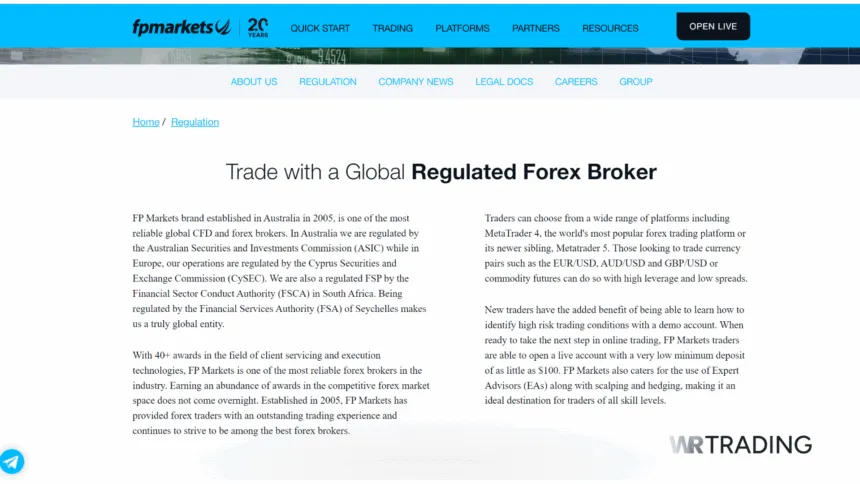
What makes FP Markets particularly attractive is its competitive trading conditions. The broker offers spreads starting from 0.0 pips, which is a significant advantage for those looking to keep their trading costs low. Additionally, the platform boasts impressive execution speeds, which means your trades are completed quickly, helping you capitalise on market movements more effectively. The broker also offers leverage up to 500:1.
FP Markets provides access to various trading instruments, including forex, stocks, indices, commodities, cryptocurrency, and ETFs. This variety allows traders to diversify their portfolios easily. Moreover, the broker is known for its excellent customer support and educational resources, making it a great option for beginners and experienced traders looking to enhance their trading skills.
| Feature | Information |
|---|---|
| Spreads and Commission | Varies based on account: Spread – from 0.0 pips Commission – From no commission to $3 per lot |
| Trading Platforms | MetaTrader 4, MetaTrader 5, cTrader, TradingView, IRESS, and WebTrader. |
| Asset Types | Forex, stocks, indices, commodities, cryptocurrency, and ETFs. |
| Tradable Assets | Over 10,000 |
| Leverage | 500:1 |
| Customer Support | Email, live chat, and phone support. |
| Demo Account | Yes |
| Educational Content | Video tutorials and trading glossary. |
| Regulation | ASIC, FSCA, FSA, FSC, and CySEC. |
2. Pepperstone
Pepperstone is backed by strong regulatory oversight from:
- The Australian Securities and Investments Commission (ASIC)
- The Financial Conduct Authority (FCA)
- Dubai Financial Services Authority (DFSA)
- The Cyprus Securities and Exchange Commission (CySEC)
- Federal Financial Supervisory Authority (BaFin)
- Competition and Markets Authority (CMA)
This extensive regulation provides a safety net for traders and underlines the broker’s commitment to maintaining high operational standards. If you’re looking for a broker that combines security with top-notch trading features, Pepperstone is a solid contender.
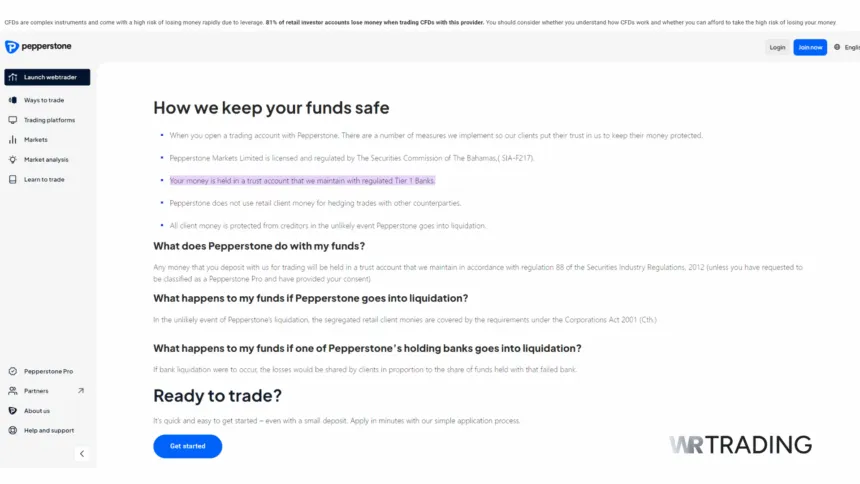
What makes Pepperstone great isn’t just its regulatory compliance and innovative approach to trading. The broker offers some of the most competitive spreads in the market and high leverage of 500:1, but that’s just the beginning. One of Pepperstone’s standout features is its array of trading platforms. Traders can choose from MetaTrader 4, MetaTrader 5, TradingView, and cTrader, each offering a unique set of tools and functionalities tailored to different trading styles.
Additionally, Pepperstone provides exceptional support for algorithmic trading. The cTrader platform, particularly, is known for its advanced charting tools and algorithmic trading capabilities. This is a massive plus for traders who rely on automated strategies. Moreover, the broker’s educational resources are second to none. With a comprehensive range of tutorials, webinars, and market analysis, Pepperstone ensures that traders are well-equipped to navigate the complexities of the forex market.
| Feature | Information |
|---|---|
| Spreads and Commission | Varies based on account: Spread – from 0.0 pips Commission – From no commission to $3 per lot |
| Trading Platforms | MetaTrader 4, MetaTrader 5, cTrader, and TradingView |
| Asset Types | Forex, commodities, indices, cryptocurrency, stocks, and ETFs. |
| Tradable Assets | Over 1,200 |
| Leverage | 500:1 |
| Customer Support | Email and phone support. |
| Demo Account | Yes |
| Educational Content | Webinars, educational videos, and trading guides. |
| Regulation | FCA, CySEC, ASIC, BaFin, CMA, and DFSA. |
3. IG
IG is one of the most established names in the forex trading industry, with a history that dates back to 1974. Regulated by several top-tier authorities, such as:
- The Australian Securities and Investments Commission (ASIC)
- The Financial Conduct Authority (FCA)
- Federal Financial Supervisory Authority (BaFin)
- Swiss Financial Market Supervisory Authority (FINMA)
- Dubai Financial Services Authority (DFSA)
- Financial Sector Conduct Authority (FSCA)
- Monetary Authority of Singapore (MAS)
- Financial Services Agency (JFSA)
- Financial Market Authority (FMA)
IG offers a level of security and trust that few brokers can match. This extensive regulatory coverage ensures that IG adheres to the highest financial integrity and transparency standards, providing traders with peace of mind.
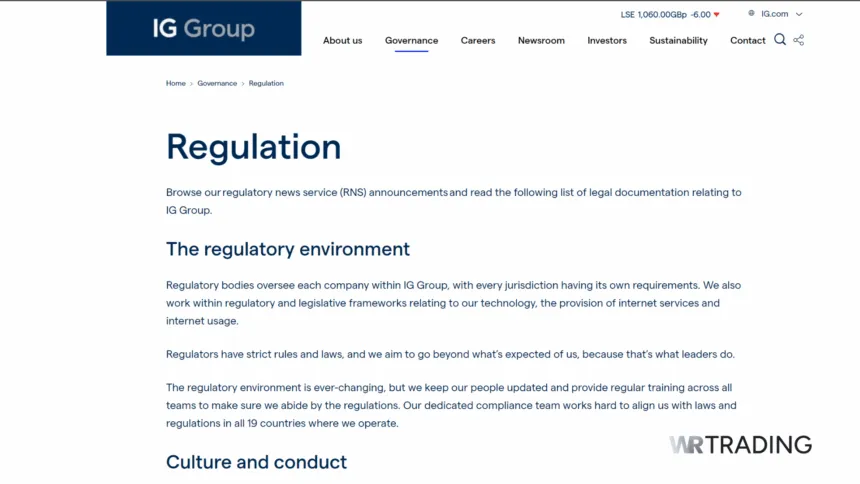
One of IG’s key strengths is its impressive range of trading instruments. While many brokers focus primarily on forex, IG offers over 17,000 assets, including commodities, indices, cryptocurrency, stocks, IPOs, and ETPs. This broad spectrum allows traders to diversify their portfolios and explore various trading opportunities beyond the forex market. Also, some instruments have a leverage of up to 200:1.
IG’s trading platform is renowned for its user-friendly interface and powerful features. Whether you prefer the proprietary IG platform, MetaTrader 4, or the advanced ProRealTime, IG has you covered. IG also excels in providing educational resources and research tools.
| Feature | Information |
|---|---|
| Spreads and Commission | Varies based on account: Spread – from 0.0 pips Commission – From no commission to $3 per lot |
| Trading Platforms | MetaTrader 4, IG Trading Platform, and ProRealTime. |
| Asset Types | Forex, commodities, indices, cryptocurrency, stocks, IPOs, and ETPs. |
| Tradable Assets | Over 17,000 |
| Leverage | 200:1 |
| Customer Support | Email and phone support. |
| Demo Account | Yes |
| Educational Content | IG Academy, news, seminars, and webinars. |
| Regulation | ASIC, FCA, BaFin, FINMA, DFSA, FSCA, MAS, JFSA, and FMA. |
4. XTB
XTB is a globally recognised forex broker with strong regulatory oversight and exceptional trading conditions. It is regulated by several prestigious bodies, including:
- The Cyprus Securities and Exchange Commission (CySEC)
- Polish Financial Supervision Authority (KNF)
- The Financial Conduct Authority (FCA)
- Dubai Financial Services Authority (DFSA)
- Financial Services Commission in Mauritius (FSC)
- International Financial Services Centres Authority (IFSC)
This broad regulatory framework ensures that XTB adheres to strict financial transparency and client protection standards, making it a trustworthy choice for traders worldwide.
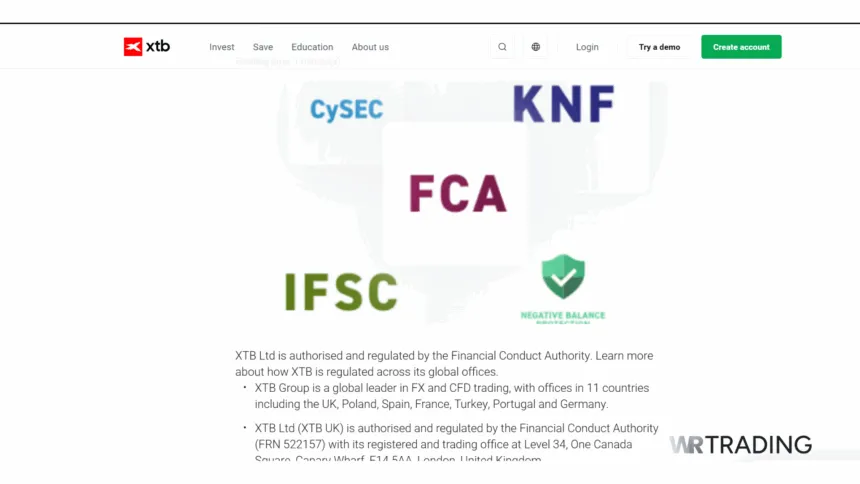
What sets XTB apart is its award-winning trading platform, xStation 5. This platform is known for its intuitive interface, fast execution speeds, and advanced trading tools. Whether you are a beginner or an experienced trader, xStation 5 offers a seamless trading experience with features like real-time market commentary, advanced charting tools, and a comprehensive range of technical analysis indicators. The platform is also available on desktop and mobile, allowing you to trade efficiently.
| Feature | Information |
|---|---|
| Spreads and Commission | Varies based on account: Spread – from 0.0 pips Commission – From 0% per lot |
| Trading Platforms | xStation 5 and xStation Mobile |
| Asset Types | Forex, stocks, indices, ETFs, and commodities. |
| Tradable Assets | Over 2,100 |
| Leverage | 200:1 |
| Customer Support | Email, live chat, and phone support. |
| Demo Account | Yes |
| Educational Content | Knowledge base and market analysis |
| Regulation | CySEC, KNF, FCA, DFSA, FSC, and IFSC. |
5. AvaTrade
AvaTrade is a highly respected name in the forex industry, known for its regulatory framework and extensive trading options. Multiple authorities regulate the broker:
- The Central Bank of Ireland (CBI)
- Polish Financial Supervision Authority (KNF)
- British Virgin Islands Financial Services Commission (BVI)
- The Australian Securities and Investments Commission (ASIC)
- The Financial Sector Conduct Authority (FSCA)
- The Financial Futures Association of Japan (FFAJ)
- The Cyprus Securities and Exchange Commission (CySEC)
- The Israel Securities Authority (ISA)
This diverse regulatory oversight ensures that AvaTrade adheres to the highest financial security and operational transparency standards, providing traders with a safe and reliable trading environment.
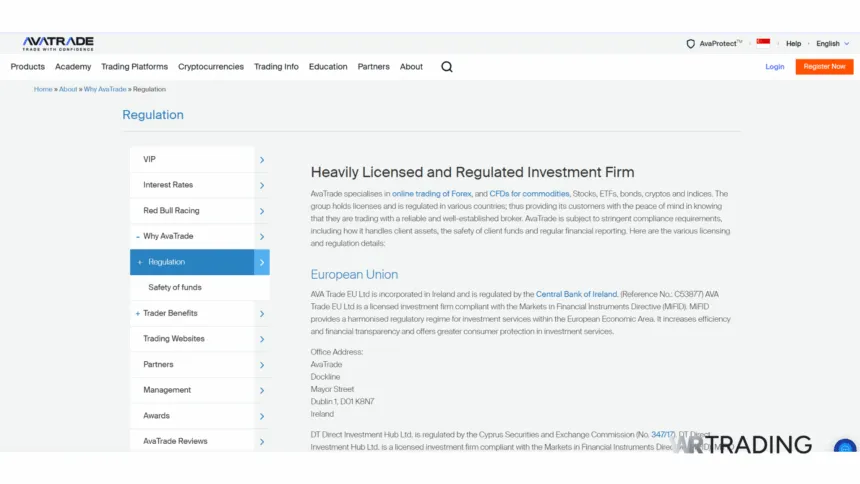
AvaTrade excels in offering a comprehensive suite of trading platforms to meet its clients’ diverse needs. Traders can choose from the popular MetaTrader 4 and MetaTrader 5 platforms and AvaTrade’s proprietary platforms, AvaTradeGO and AvaOptions. These platforms are equipped with advanced trading tools, leverage up to 500:1, and a range of technical indicators, making them suitable for traders of all experience levels.
In addition to its platform offerings, AvaTrade provides a wide array of educational resources and trading tools. The broker’s education section includes video tutorials, analysis, webinars, and daily market updates, helping traders to enhance their trading knowledge and stay updated with market trends.
| Feature | Information |
|---|---|
| Spreads and Commission | Varies based on account: Spread – from 0.0 pips Commission – From no commission to $6 per lot |
| Trading Platforms | MetaTrader 4, MetaTrader 5, AvaOptions, AvaTrade App, and Mac Trading. |
| Asset Types | Forex, commodities, indices, ETFs, bonds, and stock. |
| Tradable Assets | Over 1,250 |
| Leverage | 500:1 |
| Customer Support | Email, live chat, and phone support. |
| Demo Account | Yes |
| Educational Content | Tutorials, technical analysis, strategy overviews, and guides. |
| Regulation | CySEC, CBI, ASIC, FSCA, FFAJ, KNF, BVI, and ISA. |
How We Tested the Best Regulated Forex Brokers
Testing and comparing forex brokers is a process that requires a thorough evaluation of multiple factors to ensure that traders are getting the best possible service. Here’s an overview of how we conducted our testing to identify the most regulated and reliable forex brokers:
Regulatory Status
The first and most crucial aspect we examined was each broker’s regulatory status. We checked for licenses and oversight from top-tier regulatory bodies such as ASIC, FCA, CySEC, and others. A broker’s regulatory status indicates its adherence to strict financial standards, operational transparency, and client protection measures.
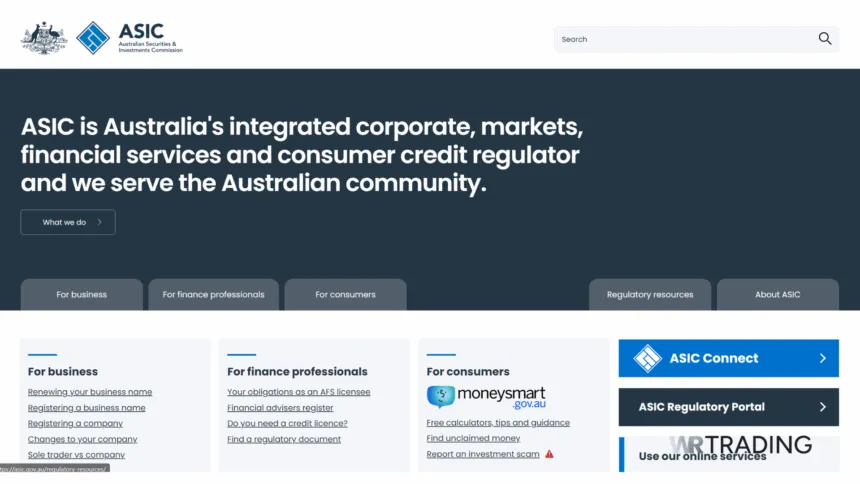
Trading Conditions
We evaluated each broker’s trading conditions, including spreads, commissions, and execution speeds. Tight spreads and low commissions are vital for minimising trading costs, while fast execution speeds are essential for effective trading, especially for strategies like scalping and high-frequency trading.
Range of Instruments
A diverse range of trading instruments allows traders to diversify their portfolios and explore various market opportunities. We assessed various financial products available, including forex pairs, indices, commodities, shares, and cryptocurrencies.
Trading Platforms
The functionality and reliability of trading platforms are crucial for a seamless trading experience. We tested the brokers’ platforms, such as MetaTrader 4, MetaTrader 5, cTrader, and proprietary platforms, to ensure they offer advanced charting tools, user-friendly interfaces, and automated trading capabilities.
Customer Support
Quality customer support is essential for resolving issues and providing assistance when needed. We contacted each broker’s customer service to evaluate their responsiveness, professionalism, and availability. We ensured that support was accessible via multiple channels, including live chat, email, and phone.
Educational Resources
Educational resources help traders improve their skills and make informed trading decisions. We reviewed the educational materials provided by each broker, including webinars, tutorials, articles, and market analysis, to determine their comprehensiveness and usefulness.
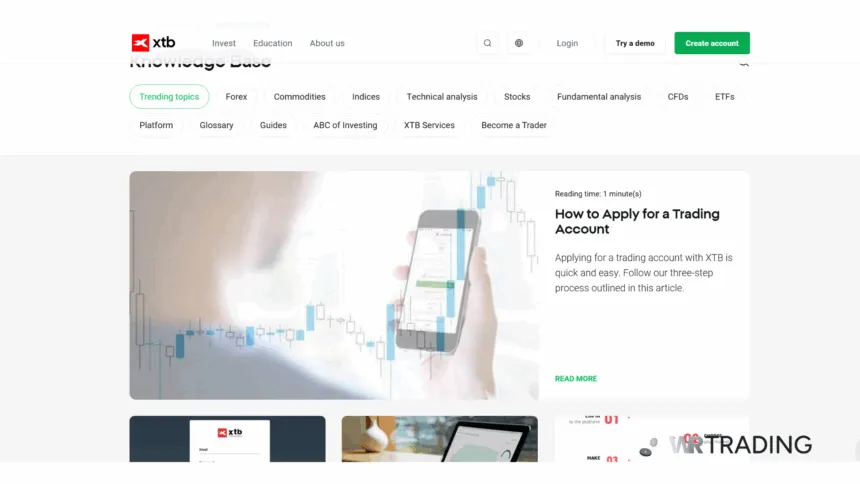
Security of Funds
The safety of client funds is essential. We investigated each broker’s measures to protect client funds, such as segregation of funds, negative balance protection, and participation in compensation schemes.
What Are Trading Brokers’ Regulations?
Trading broker regulations are a set of rules and standards that forex brokers must adhere to, ensuring they operate fairly, transparently, and securely. These regulations are enforced by governmental and independent regulatory bodies across different regions. The primary aim of these regulations is to protect traders and maintain the integrity of the financial markets.
Key Objectives of Broker Regulations
- Protecting Traders: Regulations protect traders from fraudulent activities and ensure their funds are safe. This includes measures such as segregating client funds from the broker’s operational funds, which helps prevent the misuse of client money.
- Ensuring Transparency: Regulated brokers must provide transparent pricing and clear terms of service. This means traders can trust their quotes and know all fees upfront.
- Maintaining Market Integrity: Regulators enforce rules that promote fair trading practices and prevent market manipulation. This helps maintain a level playing field where traders can operate without unfair advantages or deceptive practices.
- Financial Soundness: Regulatory bodies often require brokers to maintain sufficient capital reserves to meet financial obligations. This reduces the risk of broker insolvency and protects traders’ investments.
Compliance and Audits
Regulated brokers must comply with ongoing requirements set by their regulatory bodies. This includes regular financial reporting, audits, and adherence to conduct rules.
Brokers that fail to comply with these regulations can face severe penalties, including fines, license suspension, or revocation.
Different Tiers of Regulations
Regulatory bodies in the forex industry vary in their levels of oversight and enforcement. Understanding these different tiers can help traders choose brokers with the highest safety and transparency standards.
Top-Tier Regulators
Top-tier regulators are known for their stringent standards and rigorous enforcement. Brokers regulated by these authorities are generally the most trustworthy and secure.
- Financial Conduct Authority (FCA): The FCA, based in the UK, is among the most respected regulatory bodies. It enforces strict requirements on brokers, including high capital adequacy standards, segregation of client funds, and regular audits. This ensures that brokers operate with transparency and protect their clients’ interests.
- Australian Securities and Investments Commission (ASIC): ASIC is another top-tier regulator known for its rigorous regulatory framework. Brokers under ASIC’s oversight must adhere to strict financial standards, provide transparent pricing, and ensure the security of client funds through segregation.
- Cyprus Securities and Exchange Commission (CySEC): CySEC regulates brokers in Cyprus and is part of the European Union’s regulatory framework. It requires brokers to meet high financial and operational standards, including regular audits and client fund protection measures.
Mid-Tier Regulators
Mid-tier regulators provide good oversight but may not be as stringent as top-tier regulators. However, they still ensure a reasonable level of security and transparency.
- Financial Sector Conduct Authority (FSCA): Based in South Africa, the FSCA oversees financial markets and enforces regulations to ensure fair trading practices and client protection. While not as stringent as the FCA or ASIC, the FSCA maintains significant regulatory standards.
- Dubai Financial Services Authority (DFSA): The DFSA regulates brokers in the Dubai International Financial Centre (DIFC). It requires brokers to comply with financial soundness and client protection measures, although the regulatory framework is slightly less rigorous than that of top-tier regulators.
Lower-Tier Regulators
Lower-tier regulators provide basic regulatory oversight. Brokers regulated by these authorities may offer less security and transparency than those under top or mid-tier regulators.
- International Financial Services Commission (IFSC): The IFSC, based in Belize, provides a regulatory framework that is less strict than that of top-tier regulators. While it offers some level of oversight, it is not as rigorous in enforcing compliance and protecting clients.
- Vanuatu Financial Services Commission (VFSC): The VFSC offers a more lenient regulatory environment. Brokers regulated here must meet basic financial standards, but the enforcement level is lower than that of higher-tier regulators.
Is a Regulated Broker Secure to Use?
Yes, a regulated broker is secure to use. Regulatory bodies impose strict standards that ensure brokers operate transparently and protect client funds. This includes keeping client money in separate accounts to safeguard it from the broker’s financial issues. Regular financial reporting and independent audits are also required, ensuring the broker remains financially sound and trustworthy. This oversight provides a safer trading environment, giving traders confidence in the broker’s reliability and fairness.
Be Aware of Fake Regulations
While trading with a regulated broker generally provides security, it’s essential to be cautious of fake regulations. Some brokers may falsely claim to be controlled by reputable authorities to lure unsuspecting traders. These fraudulent brokers can pose significant risks, including potential loss of funds and unfair trading practices.
Always verify a broker’s regulatory status directly with the regulatory body to protect yourself. Most regulatory authorities have online databases where you can check a broker’s license number and regulatory details. Be wary of brokers that provide vague information or do not appear in these official databases.
Ensuring your broker’s legitimacy helps secure your investments and provides peace of mind while trading.
If you’re having trouble avoiding fake platforms, consider joining the WR Trading course. This course covers everything you need to know about forex trading, from using the correct platforms and strategies to mastering technical analysis.
How to Find Out if a Forex Broker Is Regulated
Ensuring that a forex broker is regulated is essential for the safety and security of your trading activities. Here’s a detailed guide to help you verify the regulatory status of a forex broker.
Step 1: Check the Broker’s Website
Start by visiting the broker’s official website. Reputable brokers typically display their regulatory information prominently, often in the footer of their homepage or within an “About Us” or “Regulation” section. Look for details such as the name of the regulatory authority and the broker’s license number. This initial check gives you the basic information about the broker’s claimed regulatory status.
Step 2: Verify with the Regulatory Authority
Take the regulatory information you found on the broker’s website and visit the official website of the regulatory authority mentioned. For example, if the broker claims to be regulated by the UK’s Financial Conduct Authority (FCA), visit the FCA’s website.
Step 3: Use the Regulator’s Online Database
Once on the regulator’s website, find their online database or search tool. Most regulatory bodies provide a way to look up brokers by their license number or name. Enter the broker’s details into the search tool. This step helps you confirm that the broker is listed with the regulatory authority and that their license is valid. If you’re unsure which regulatory body to check, the International Organisation of Securities Commission (IOSCO) provides a directory of regulators worldwide.

Step 4: Verify the Broker’s Details
After finding the broker in the regulator’s database, verify that all the details match what is provided on the broker’s website. This includes the broker’s name, license number, and regulatory status. Ensuring that the details are consistent helps confirm the broker’s legitimacy.
Step 5: Check the License Status
Make sure that the broker’s license is active and in good standing. Regulatory databases will indicate whether a license is current, suspended, or revoked. An active license status is essential for ensuring the broker is regulated and compliant with necessary standards.
Disadvantages of Unregulated Forex Brokers
Trading with unregulated forex brokers can expose you to significant risks that jeopardise your investments and trading experience. Here are some key disadvantages of dealing with unregulated brokers:
Lack of Security
One of the most significant risks of trading with unregulated brokers is the lack of security for your funds. Unregulated brokers are not required to follow financial standards or maintain segregated accounts for client funds. This means your money could be used for the broker’s operational expenses or be at risk if the broker becomes insolvent.
Potential for Fraud
Unregulated brokers operate without oversight from a regulatory body, which increases the potential for fraudulent activities. These brokers can manipulate trading conditions, offer false promises, and even disappear with your funds without any legal repercussions.
The absence of regulatory scrutiny makes it easier for such brokers to engage in unethical practices.
No Legal Recourse
You have little to no legal recourse if you encounter problems with an unregulated broker, such as withdrawal issues or unfair trading practices. Regulatory bodies provide a platform for resolving disputes between traders and brokers. Without this regulatory oversight, traders are left vulnerable and without support in a conflict.
Lack of Transparency
Unregulated brokers often lack transparency in their operations. They may not provide clear information about their business practices, financial health, or trading conditions. This lack of transparency can lead to hidden fees, unfair terms, and an overall lack of trust in the broker’s services.
Pros of Regulated Brokers
Choosing a regulated forex broker offers numerous advantages that can significantly enhance your trading experience and protect your investments. The right trading broker is essential to save costs and ensure quick order execution. Here are some key benefits of trading with regulated brokers:
Enhanced Security
Regulated brokers are required to maintain high financial standards, which include segregated accounts for client funds. This separation protects your money and cannot be used for the broker’s operational expenses. In the event of the broker’s insolvency, your funds remain secure.
Legal Protection
One of the primary advantages of using a regulated broker is the legal protection it offers. Regulatory bodies provide a framework for resolving disputes between traders and brokers. If you encounter any issues, you have the assurance that the regulatory authority will intervene and help determine the matter reasonably.
Transparency
Regulated brokers must operate with a high level of transparency. They are required to disclose their financial statements, trading conditions, and any potential conflicts of interest. This transparency helps build trust and ensures you are fully aware of the terms and conditions you are trading under.
Fair Trading Practices
Regulatory bodies enforce rules that promote fair trading practices. This includes ensuring brokers offer honest pricing, promptly execute trades, and avoid manipulative behaviours. As a result, traders can trust that they are operating in a fair and honest market environment.
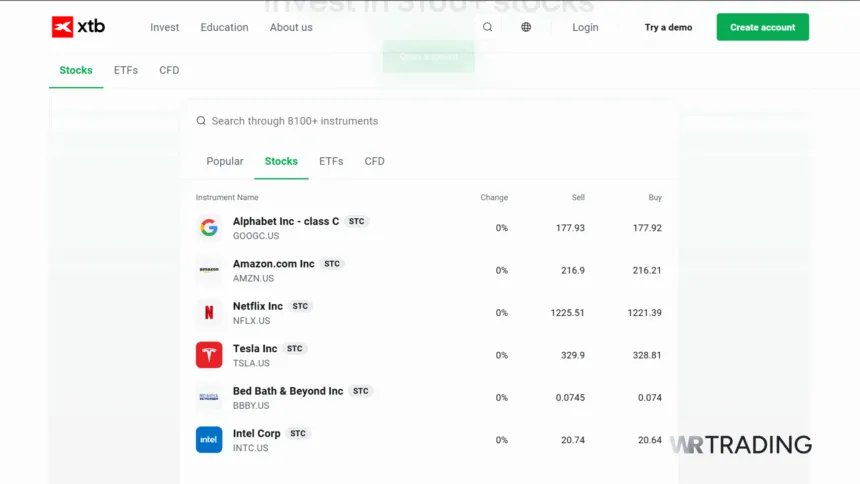
Customer Protection
Regulated brokers are obligated to implement measures that protect their clients. This includes providing negative balance protection, ensuring you cannot lose more than your initial investment. They must also follow strict procedures for handling client complaints and disputes, offering additional security and peace of mind.
Access to Compensation Schemes
Many regulatory bodies offer compensation schemes that protect traders if a broker fails. For example, in the UK, the Financial Services Compensation Scheme (FSCS) compensates clients if an FCA-regulated broker becomes insolvent. This safety net further enhances the security of trading with regulated brokers.
Conclusion
Choosing a regulated forex broker like FP Markets, Pepperstone, IG, XTB, and AvaTrade ensures your funds are secure and trading practices are fair. These brokers are top-rated for their adherence to regulatory standards, offering transparency and legal protection. In contrast, unregulated brokers pose risks such as fraud and fund insecurity. Verifying a broker’s regulatory status is essential to confidently safeguarding your investments and trading.
Once again, these are the Top 5 Regulated Forex Brokers and their Key Benefits:
- FP Markets – Known for its excellent trading conditions and strong regulatory framework
- Pepperstone – Offers competitive spreads and robust customer support
- IG – A well-established broker with a broad range of trading instruments
- XTB – Features a user-friendly platform and stringent regulatory compliance
- AvaTrade – Provides a variety of trading options and is highly trusted in the industry
Frequently Asked Questions on Regulated Forex Brokers
Why Is It Important to Choose a Regulated Forex Broker?
Choosing a regulated forex broker ensures that your funds are protected and trading practices are fair. Regulatory bodies enforce strict standards and provide legal protection, reducing the risk of fraud and enhancing your trading experience.
How Can I Verify if a Forex Broker Is Regulated?
Start by checking the broker’s website for regulatory information, such as the regulatory authority and license number. Then, visit the regulator’s official website and use their database to confirm the broker’s status. Ensure all details match and the license is active.
What Are the Risks of Trading With an Unregulated Broker?
Trading with an unregulated broker can expose you to risks such as fund insecurity, potential fraud, and a lack of legal recourse. Unregulated brokers are not bound by strict standards, which can lead to unfair trading practices, making your investments vulnerable.
What Are Some Top-Tier Regulatory Bodies?
Top-tier regulatory bodies include the Financial Conduct Authority (FCA) in the UK, the Australian Securities and Investments Commission (ASIC), and the Cyprus Securities and Exchange Commission (CySEC). These regulators enforce strict compliance and financial standards, and brokers regulated by these bodies are generally more trustworthy.
Can More Than One Authority regulate a Broker?
Yes, a broker can be regulated by multiple authorities in different regions. This provides an extra layer of security and ensures compliance with various international standards. Multi-regulation enhances the broker’s credibility.







